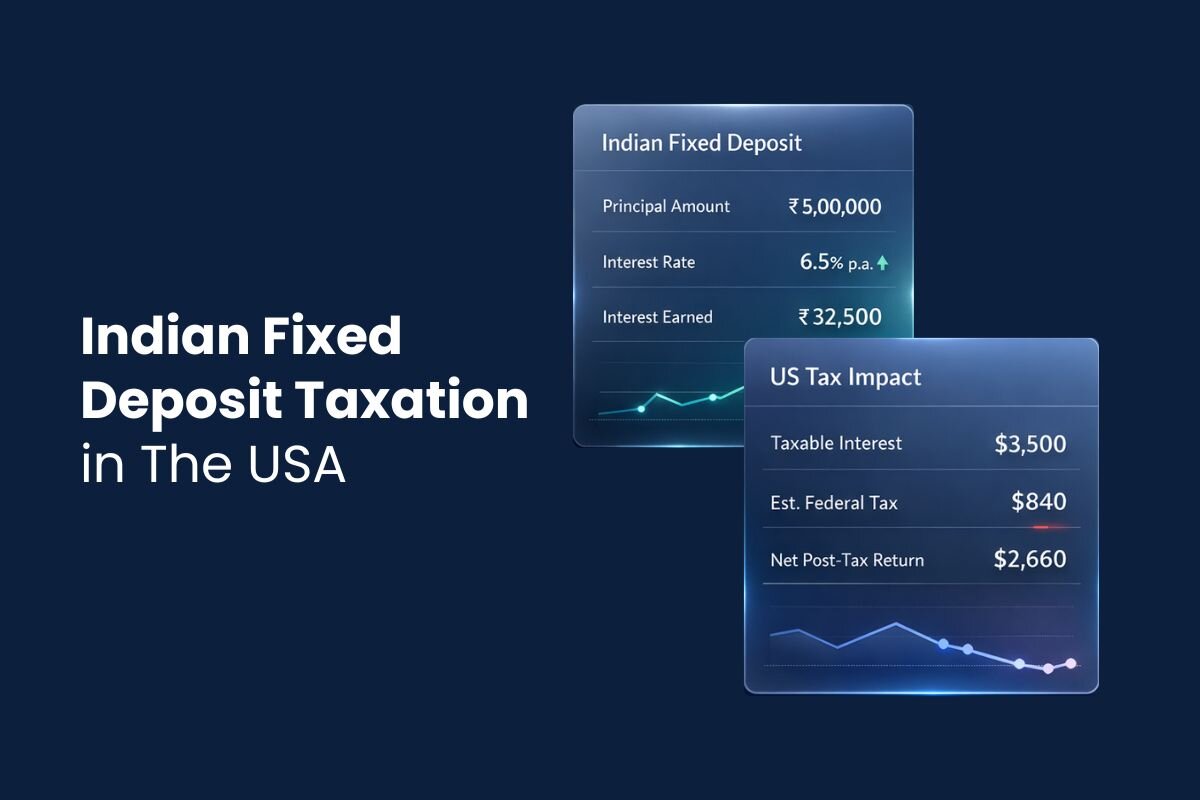NRI (Non-Resident Indian) refers to an Indian citizen living abroad for work, business, studies, or other reasons. Your NRI status matters because it impacts taxes, banking, and investments.
This guide breaks down NRI definitions, tax rules, and the easiest ways to manage your money while living overseas.
Key Takeaway
Your NRI status affects everything from taxes to banking, investments, and property rights - so knowing the rules is critical.
- Income Tax Act: Based on days spent in India (182/120-day rules).
- FEMA: Based on your intent to stay abroad (work, business, study).
- Banking: Resident accounts become invalid; you need NRE/NRO/FCNR accounts.
- Taxes: NRIs pay tax only on Indian income, not global earnings.
- Compliance: Status must be checked yearly to avoid penalties or misreporting.
What Does NRI Mean?
NRI stands for Non-Resident Indian - it refers to anyone with an Indian passport who lives outside India. While this might sound simple, the definition changes depending on which rules you're looking at.
We mainly use NRI to describe someone who has moved abroad to:
- Work overseas
- Start a business in another country
- Study at foreign universities
- Stay abroad for other valid reasons
You become an NRI if you stay outside India for more than 182 days in a financial year. This time-based rule helps determine NRI status, though different authorities might use slightly different day counts.
The NRI tag also covers specific cases like:
- Indian sailors working on ships
- Students enrolled in foreign universities
The basic contours stay the same: an NRI is an Indian citizen who spends much of the year outside India, whatever their citizenship status.
Why the definition matters for legal and tax purposes
Knowing your exact NRI status matters because it affects your financial and legal obligations. Your tax situation tops the list of things that change.
The Income Tax Act 1961 sets different rules for residents and NRIs. NRIs pay tax only on money earned in India, while residents must pay on all their worldwide income.
This difference can save you a lot of money, especially if you earn most of your income abroad.
Two main sets of rules define an NRI differently:
Under Income Tax Act (IT Act):
- Looks at how long you actually stay in India
- Labels you an NRI if you're in India less than 182 days in the financial year
- Mainly deals with how much tax you owe India
Under Foreign Exchange Management Act (FEMA):
- Focuses on why you're staying abroad
- Uses a 183-day rule (one more day than the IT Act)
- Controls your money moves in India, including investments, bank accounts, and sending money abroad
Anyone wanting NRI status should stay in India no more than 181 days to meet both tax and FEMA rules.
Your NRI status changes:
- Which bank accounts you can have (NRE, NRO, or FCNR)
- What you can invest in within India
- Your property rights and limits
- Rules about moving money in and out of India
Small differences in these definitions can create big headaches. To cite an instance, see how someone might qualify as an NRI under one rule but not another, making things complicated.
The NRI label helps Indian officials track money transfers and financial deals to ensure everything's legal. It also determines if you can benefit from tax agreements (DTAA) between India and other countries.
NRI Definition as per Income Tax Act
The Income Tax Act gives us the vital definition of who is an NRI in India. This definition affects your tax liabilities directly. The Income Tax definition mainly looks at physical presence rather than intent, unlike other classifications.
182-day rule explained
The 182-day rule forms the foundation of NRI status determination. This simple calculation works whatever your citizenship or place of birth. You become a non-resident Indian when you stay in India less than 182 days during a financial year.
You'll automatically become a resident for that tax year if you arrive in India on or before September 30th. This happens because your stay would go beyond the 182-day limit by March 31st, the end of the financial year.
This rule works the same way for everyone. Indian citizens working abroad, foreign nationals of Indian origin - everyone follows the same rule. The actual days you stay matter more than your reason to visit or your connections to India.
60/365-day rule and exceptions
There's also a second criterion that could make you a resident even with a shorter stay. You'll become a resident if you:
- Stay in India for 60 days or more during the financial year, and
- Have been in India for 365 days or more during the four years right before that financial year
This two-part test catches people who often visit India over multiple years. The Income Tax Act offers some important exceptions, since this might unfairly affect certain groups:
- Indian citizens who leave India to work abroad
- Indian citizens working as crew members on Indian ships
- Indian citizens or Persons of Indian Origin (PIOs) visiting India (subject to income thresholds)
These groups get their 60-day limit extended to 182 days. This gives them more freedom to visit India while keeping their non-resident status.
Finance Act 2020 changes
The Finance Act 2020 brought major changes to tighten NRI status rules, especially for high-income individuals. Since April 1, 2020 (Assessment Year 2021-22), Indian citizens or PIOs with Indian income above ₹15 lakhs (excluding foreign-source income) now have their 182-day exception reduced to 120 days.
This is a big deal as it means that if your Indian income crosses the ₹15 lakh mark, you can only stay in India for up to 119 days to keep your non-resident status. These changes aim to stop people from running substantial business activities in India while claiming tax benefits as non-residents.
Income from foreign sources here means income earned outside India, except money from a business controlled in India or a profession set up in India.
Section 6(1A) and deemed residency
The Finance Act 2020's most important addition came through Section 6(1A), which brought in "deemed residency." An Indian citizen with Indian-source income above ₹15 lakhs becomes a deemed resident if they don't pay tax in any other country due to domicile, residence, or similar criteria.
This rule targets "stateless persons" or "tax nomads" - people who arrange their affairs to avoid paying tax anywhere. Such people can become residents for tax purposes even if they never step foot in India during the financial year.
These deemed residents don't become ordinary residents. They fall under "Resident but Not Ordinarily Resident" (RNOR) category. This means India can only tax their Indian income, not their global earnings.
You need to check these rules each financial year to determine your residential status. A small mistake in calculating your India stay could completely change your tax obligations and compliance needs.
Eligibility Criteria to Become an NRI
Indian laws have specific criteria that define who qualifies as a Non-Resident Indian. These requirements determine who is an NRI and affect taxation, banking, and investment rules.
Minimum days of stay abroad
The life-blood of NRI eligibility lies in the physical presence test. You can qualify as an NRI through two main paths:
- Stay outside India for at least 183 days in a financial year according to FEMA regulations
- Your stay in India should be less than 182 days during the financial year as per Income Tax Act
You might still qualify as an NRI even if you don't meet the 182-day rule. The alternative path requires you to:
- Stay in India less than 60 days in the current financial year, and
- Limit your time in India to less than 365 days during the previous four financial years
The Finance Act 2020 brought a significant change for high earners. This is a big deal as it means that if your Indian income (excluding foreign-source income) crosses ₹15 lakh during the financial year, the 60-day limit changes to 120 days. You can now stay up to 119 days in India without losing NRI status, provided you meet the 365-day condition for the previous four years.
Purpose of stay: employment, education, etc.
Your intent is vital in determining NRI status under FEMA regulations. You become an NRI when you live outside India to:
- Work abroad
- Run a business outside India
- Study at international institutions
- Stay abroad indefinitely for any other reason
FEMA's intent-based approach is different from tax laws' day-counting method. You could become an NRI the day you leave India if you plan to stay abroad indefinitely.
Students get special treatment. The moment you leave India to study abroad, FEMA regulations make you eligible for NRI status. This lets you open special NRI accounts and make investments allowed for non-residents.
Special cases: seafarers, diplomats, government employees
Seafarers on international ships have unique rules:
- Indian seafarers working on Indian ships need to stay in India less than 182 days in a financial year to qualify as NRIs
- Days spent on coastal travel in foreign-going cargo vessels count toward NRI status
- The law excludes the period between Continuous Discharge Certificate (CDC) start and end dates from Indian stay calculation
A helpful clarification exists for seafarers about days spent outside India. Time spent abroad, including job search periods between contracts, counts toward NRI status. This protects seafarers from being unfairly classified as tax residents when they look for work between contracts.
The upcoming Income Tax Bill, 2025 plans to remove "for the purpose of employment" and only recognize "employment outside India" when determining NRI status. This change could affect people who spend time abroad just looking for jobs rather than working.
Diplomats and government employees must follow the same day-count rules as other citizens. Their long foreign assignments usually help them qualify easily for NRI status under both tax and FEMA regulations.
How to Determine Your NRI Status
Getting your NRI status calculation right is a vital part of tax planning and staying compliant with Indian regulations. Working out who is an NRI goes beyond counting days—you need to understand specific rules and apply them to your situation.
Step-by-step calculation method
You can determine your NRI status through this systematic approach:
- Track your physical presence by counting the exact number of days you've stayed in India during the financial year (April 1 to March 31). The dates of departure and arrival both count as days spent in India.
- Apply the primary test: You qualify as a non-resident if you've stayed in India for less than 182 days in the current financial year.
- Apply the secondary test if needed: You'll still qualify as an NRI if you've stayed in India for less than 60 days in the current financial year AND less than 365 days during the four preceding years.
- Check for exceptions: Different thresholds may apply if you're an Indian citizen or person of Indian origin visiting India, leaving for employment abroad, or working as a crew member.
- Verify high-income provisions: The 60-day limit becomes 120 days if your Indian income (excluding foreign income) exceeds ₹15 lakhs.
Note that time spent in India's territorial waters (12 nautical miles from the coastline) counts as stay in India.
Using an NRI status calculator
The Income Tax Department provides an official residential status calculator to make this complex process easier:
- Visit the Income Tax India website to access the calculator.
- Choose the assessment year from the dropdown menu.
- Add your travel details with exact arrival and departure dates.
- Enter your stay duration for preceding years.
- Provide information about your Indian income if needed.
The calculator processes this information and tells you whether you're a non-resident, resident but not ordinarily resident (RNOR), or resident and ordinarily resident (ROR).
Many private financial websites offer similar calculators that are easier to use. Notwithstanding that, you should always check results against official rules to be completely sure.
Common mistakes to avoid
Watch out for these frequent errors while determining your NRI status:
- Miscounting days: A single-day error in calculation can change your tax status from NRI to resident, which means your global income could become taxable in India.
- Confusing FEMA vs. Income Tax definitions: Many people think NRI status under FEMA and Income Tax Act are similar—they serve different purposes.
- Overlooking exceptions: Special rules exist for Indian citizens visiting India or those leaving for employment—missing these exceptions leads to wrong status determination.
- Ignoring residential status changes: Each financial year needs a fresh assessment of your NRI status based on that year's stay pattern.
- Neglecting documentation: Keep all your travel records including passport stamps or boarding passes to prove your movements.
These guidelines help you determine your NRI status correctly and comply with Indian regulations.
Tax Rules for NRIs in India
Tax planning becomes a vital part of financial management at the time you live outside India. The Indian tax system treats NRIs differently from residents and has specific rules about taxable income and available benefits.
What income is taxable in India
NRIs need to pay taxes only on income earned or accrued in India. The taxable income sources are:
- Salary received for services rendered in India
- Income from property located in India
- Capital gains from transfer of assets situated in India
- Interest earned on NRO accounts and fixed deposits
- Income from business controlled or set up in India
Long-term capital gains from property and other assets have a 20% tax rate with a TDS (Tax Deducted at Source) rate of 20%. Short-term capital gains from equity shares subject to securities transaction tax face a 10% tax rate.
What income is exempt
NRIs don't need to pay taxes on these income sources:
- Interest earned on NRE (Non-Resident External) accounts
- Interest on FCNR (Foreign Currency Non-Resident) accounts
- Interest on RFC (Resident Foreign Currency) accounts for account holders with RNOR status
- Long-term capital gains from equity shares with Securities Transaction Tax
- Capital gains from government securities transferred outside India between two NRIs
Dividend income from Indian companies stayed tax-free until FY 2019-20. This changed from FY 2020-21 after the removal of Dividend Distribution Tax.
Deductions available under old regime
The old tax regime lets NRIs claim several deductions:
- Section 80C deductions up to ₹1.5 lakh for life insurance premiums, tuition fees, and home loan principal repayment
- Section 80D for health insurance premiums up to ₹25,000 for self, spouse, and dependent children, plus an additional ₹25,000 for parents
- Section 80E for interest on education loans (no maximum limit, but valid for 8 consecutive years)
- Section 24(b) allowing up to ₹2 lakh deduction on interest paid on housing loans for self-occupied property
The Section 87A rebate that provides tax relief for incomes up to ₹7 lakh under the new regime doesn't apply to NRIs.
DTAA and avoiding double taxation
Double Taxation Avoidance Agreements (DTAAs) help NRIs avoid paying tax twice on the same income. India has DTAAs with more than 90 countries. These agreements offer three ways to claim relief:
- Tax credit method: You can claim taxes paid in one country as credit in your country of residence
- Exemption method: Your income gets taxed in only one country
- Reduced tax rates: Special lower rates apply to specific income types like dividends, interest, and royalties
You'll need a Tax Residency Certificate from your country of residence to get DTAA benefits.
Banking and Financial Rules for NRIs
Your banking options in India change the moment you become an NRI. The Reserve Bank of India requires you to use specific account types to manage your cross-border finances.
NRE vs NRO vs FCNR accounts
Indian banks provide three unique account types to NRIs:
NRE (Non-Resident External) accounts let you keep your foreign earnings in Indian rupees. These accounts give you complete tax exemption on interest and let you move both principal and interest without restrictions.
NRO (Non-Resident Ordinary) accounts help you manage money earned in India from sources like rent, dividends, or pension. The interest you earn gets taxed in India, and you have some limits on moving money abroad.
FCNR (Foreign Currency Non-Resident) accounts work only as fixed deposits in currencies like USD, GBP, or EUR. These deposits are tax-free in India and you can move all your money abroad.
Repatriation rules and limits
Moving money abroad works differently based on your account type:
NRE and FCNR accounts let you move both principal and interest freely without any limits. NRO accounts are different - while current income like rent and dividends can be moved without limits, capital transfers are capped at USD 1 million each financial year.
Moving money from property sales follows special rules based on your purchase timing and method. Properties bought with NRE/FCNR money can be moved abroad completely, while those purchased with Indian income face the USD 1 million yearly limit.
Power of Attorney and compliance
Many NRIs give trusted people in India Power of Attorney (PoA) to handle their banking. These PoA holders have specific limits:
PoA holders can make local payments and send current income abroad from NRO accounts. With NRE accounts, they can withdraw for local expenses but can't send money abroad to anyone except the account owner.
You need Forms 15CA and 15CB to move money abroad, which prove your tax compliance.
NRI Definition as per FEMA
The Foreign Exchange Management Act (FEMA) looks at who is an NRI in a way that's completely different from other laws. FEMA cares more about why you left India than how long you've been away.
This makes a big difference in what financial moves you can make in India, from investments to banking and moving money abroad.
Intent-based definition
The Income Tax Act simply counts days, but FEMA takes a deeper look at your "intention." Your reasons for leaving India matter a lot when deciding if you're an NRI.
FEMA says a "person resident in India" is someone who has lived in India for more than 182 days during the previous financial year. Anyone who doesn't fit this rule becomes a non-resident. But there's more to it than just counting days.
You'll still be called a non-resident even if you stayed in India for more than 182 days last year if you left India:
- To work outside India
- To run a business outside India
- For anything else that shows you plan to stay away for a while
The opposite is also true. You might be called a resident even if you stayed less than 182 days if you came to India:
- To work in India
- To run a business in India
- For anything that shows you plan to stay in India for a while
Yes, it is worth noting that your status changes to non-resident the day you leave India if you plan to stay away indefinitely.
This quick change is nowhere near what other regulations say about timing.
Who qualifies under FEMA
FEMA's rules define an NRI as "a person resident outside India who is a citizen of India". This definition has sections for:
- Indian citizens working abroad
- Indian students studying overseas
- Indian seafarers used on international ships
- Spouses accompanying persons hired abroad
The original FEMA rules also recognized Persons of Indian Origin (PIOs), which meant citizens of any country (except Bangladesh or Pakistan) who:
- Had an Indian passport before, or
- Have parents or grandparents who were Indian citizens, or
- Are spouses of Indian citizens or persons who fit the above criteria
FEMA clearly separates people who are away for a short time from those who've settled abroad permanently.
Recent changes now include Overseas Citizenship of India (OCI) cardholders, which replaced the old PIO category.
Students who study abroad automatically become NRIs under FEMA. This lets them make foreign investments and open special NRE/FCNR accounts.
Eligibility Criteria to Become an NRI
Indian laws have specific criteria that define who qualifies as a Non-Resident Indian.
These requirements determine who is an NRI and affect taxation, banking, and investment rules.
1) Minimum days of stay abroad
The life-blood of NRI eligibility lies in the physical presence test. You can qualify as an NRI through two main paths:
- Stay outside India for at least 183 days in a financial year according to FEMA regulations
- Your stay in India should be less than 182 days during the financial year as per Income Tax Act
You might still qualify as an NRI even if you don't meet the 182-day rule. The alternative path requires you to:
- Stay in India less than 60 days in the current financial year, and
- Limit your time in India to less than 365 days during the previous four financial years
The Finance Act 2020 brought a significant change for high earners. This is a big deal as it means that if your Indian income (excluding foreign-source income) crosses ₹15 lakh during the financial year, the 60-day limit changes to 120 days.
You can now stay up to 119 days in India without losing NRI status, provided you meet the 365-day condition for the previous four years.
2) Purpose of stay: employment, education, etc.
Your intent is vital in determining NRI status under FEMA regulations. You become an NRI when you live outside India to:
- Work abroad
- Run a business outside India
- Study at international institutions
- Stay abroad indefinitely for any other reason
FEMA's intent-based approach is different from tax laws' day-counting method. You could become an NRI the day you leave India if you plan to stay abroad indefinitely.
Students get special treatment. The moment you leave India to study abroad, FEMA regulations make you eligible for NRI status. This lets you open special NRI accounts and make investments allowed for non-residents.
3) Special cases: seafarers, diplomats, government employees
Seafarers on international ships have unique rules:
- Indian seafarers working on Indian ships need to stay in India less than 182 days in a financial year to qualify as NRIs
- Days spent on coastal travel in foreign-going cargo vessels count toward NRI status
- The law excludes the period between Continuous Discharge Certificate (CDC) start and end dates from Indian stay calculation
A helpful clarification exists for seafarers about days spent outside India.
Time spent abroad, including job search periods between contracts, counts toward NRI status. This protects seafarers from being unfairly classified as tax residents when they look for work between contracts.
The upcoming Income Tax Bill, 2025 plans to remove "for the purpose of employment" and only recognize "employment outside India" when determining NRI status. This change could affect people who spend time abroad just looking for jobs rather than working.
Diplomats and government employees must follow the same day-count rules as other citizens. Their long foreign assignments usually help them qualify easily for NRI status under both tax and FEMA regulations.
How to Determine Your NRI Status
Getting your NRI status calculation right is a vital part of tax planning and staying compliant with Indian regulations. Working out who is an NRI goes beyond counting days - you need to understand specific rules and apply them to your situation.
Step-by-step calculation method
You can determine your NRI status through this systematic approach:
- Track your physical presence by counting the exact number of days you've stayed in India during the financial year (April 1 to March 31). The dates of departure and arrival both count as days spent in India.
- Apply the primary test: You qualify as a non-resident if you've stayed in India for less than 182 days in the current financial year.
- Apply the secondary test if needed: You'll still qualify as an NRI if you've stayed in India for less than 60 days in the current financial year AND less than 365 days during the four preceding years.
- Check for exceptions: Different thresholds may apply if you're an Indian citizen or person of Indian origin visiting India, leaving for employment abroad, or working as a crew member.
- Verify high-income provisions: The 60-day limit becomes 120 days if your Indian income (excluding foreign income) exceeds ₹15 lakhs.
Note that time spent in India's territorial waters (12 nautical miles from the coastline) counts as stay in India.
Using an NRI status calculator
The Income Tax Department provides an official residential status calculator to make this complex process easier:
- Visit the Income Tax India website to access the calculator.
- Choose the assessment year from the dropdown menu.
- Add your travel details with exact arrival and departure dates.
- Enter your stay duration for preceding years.
- Provide information about your Indian income if needed.
The calculator processes this information and tells you whether you're a non-resident, resident but not ordinarily resident (RNOR), or resident and ordinarily resident (ROR).
Many private financial websites offer similar calculators that are easier to use. Notwithstanding that, you should always check results against official rules to be completely sure.
Common mistakes to avoid
Watch out for these frequent errors while determining your NRI status:
- Miscounting days: A single-day error in calculation can change your tax status from NRI to resident, which means your global income could become taxable in India.
- Confusing FEMA vs. Income Tax definitions: Many people think NRI status under FEMA and Income Tax Act are similar - they serve different purposes.
- Overlooking exceptions: Special rules exist for Indian citizens visiting India or those leaving for employment - missing these exceptions leads to wrong status determination.
- Ignoring residential status changes: Each financial year needs a fresh assessment of your NRI status based on that year's stay pattern.
- Neglecting documentation: Keep all your travel records including passport stamps or boarding passes to prove your movements.
These guidelines help you determine your NRI status correctly and comply with Indian regulations.
Tax Rules for NRIs in India
Tax planning becomes a vital part of financial management at the time you live outside India.
The Indian tax system treats NRIs differently from residents and has specific rules about taxable income and available benefits.
What income is taxable in India
NRIs need to pay taxes only on income earned or accrued in India. The taxable income sources are:
- Salary received for services rendered in India
- Income from property located in India
- Capital gains from transfer of assets situated in India
- Interest earned on NRO accounts and fixed deposits
- Income from business controlled or set up in India
Long-term capital gains from property and other assets have a 20% tax rate with a TDS (Tax Deducted at Source) rate of 20%. Short-term capital gains from equity shares subject to securities transaction tax face a 10% tax rate.
What income is exempt
NRIs don't need to pay taxes on these income sources:
- Interest earned on NRE (Non-Resident External) accounts
- Interest on FCNR (Foreign Currency Non-Resident) accounts
- Interest on RFC (Resident Foreign Currency) accounts for account holders with RNOR status
- Long-term capital gains from equity shares with Securities Transaction Tax
- Capital gains from government securities transferred outside India between two NRIs
Dividend income from Indian companies stayed tax-free until FY 2019-20. This changed from FY 2020-21 after the removal of Dividend Distribution Tax.
Deductions available under old regime
The old tax regime lets NRIs claim several deductions:
- Section 80C deductions up to ₹1.5 lakh for life insurance premiums, tuition fees, and home loan principal repayment
- Section 80D for health insurance premiums up to ₹25,000 for self, spouse, and dependent children, plus an additional ₹25,000 for parents
- Section 80E for interest on education loans (no maximum limit, but valid for 8 consecutive years)
- Section 24(b) allowing up to ₹2 lakh deduction on interest paid on housing loans for self-occupied property
The Section 87A rebate that provides tax relief for incomes up to ₹7 lakh under the new regime doesn't apply to NRIs.
DTAA and avoiding double taxation
Double Taxation Avoidance Agreements (DTAAs) help NRIs avoid paying tax twice on the same income. India has DTAAs with more than 90 countries. These agreements offer three ways to claim relief:
- Tax credit method: You can claim taxes paid in one country as credit in your country of residence
- Exemption method: Your income gets taxed in only one country
- Reduced tax rates: Special lower rates apply to specific income types like dividends, interest, and royalties
You'll need a Tax Residency Certificate from your country of residence to get DTAA benefits.
Banking and Financial Rules for NRIs
Your banking options in India change the moment you become an NRI. The Reserve Bank of India requires you to use specific account types to manage your cross-border finances.
NRE vs NRO vs FCNR accounts
Indian banks provide three unique account types to NRIs:
- NRE (Non-Resident External) accounts let you keep your foreign earnings in Indian rupees. These accounts give you complete tax exemption on interest and let you move both principal and interest without restrictions.
- NRO (Non-Resident Ordinary) accounts help you manage money earned in India from sources like rent, dividends, or pension. The interest you earn gets taxed in India, and you have some limits on moving money abroad.
- FCNR (Foreign Currency Non-Resident) accounts work only as fixed deposits in currencies like USD, GBP, or EUR. These deposits are tax-free in India and you can move all your money abroad.
Repatriation rules and limits
Moving money abroad works differently based on your account type:
NRE and FCNR accounts let you move both principal and interest freely without any limits. NRO accounts are different - while current income like rent and dividends can be moved without limits, capital transfers are capped at USD 1 million each financial year.
Moving money from property sales follows special rules based on your purchase timing and method.
Properties bought with NRE/FCNR money can be moved abroad completely, while those purchased with Indian income face the USD 1 million yearly limit.
Power of Attorney and compliance
Many NRIs give trusted people in India Power of Attorney (PoA) to handle their banking. These PoA holders have specific limits:
PoA holders can make local payments and send current income abroad from NRO accounts. With NRE accounts, they can withdraw for local expenses but can't send money abroad to anyone except the account owner.
You need Forms 15CA and 15CB to move money abroad, which prove your tax compliance.
Conclusion
You need to know your NRI status to manage your money well while living abroad. This piece explains who can call themselves an NRI under different rules. The difference between the Income Tax Act's 182-day rule and FEMA's approach based on intent will affect your tax duties and what you can do with your money in India.
You must check your residential status every financial year based on how long you stay in India. A single day's error could change your tax status. This means your global income might become taxable in India instead of just your Indian income.
Keeping exact records of your travel dates is crucial. Tax agreements with more than 90 countries will protect you from paying taxes twice. NRE, NRO, and FCNR accounts are great ways to handle your money across borders.
NRIs can invest freely in Indian real estate and financial markets. But some limits apply to buying agricultural land and certain financial products. These rules show why knowing your exact status matters more than just having a label.
NRI rules and benefits keep changing. The Finance Act 2020 brought big changes that target high-income people and "tax nomads." You should stay updated about new rules to protect your money.
Whether you work abroad for a short time or have moved permanently, knowing NRI rules helps you follow the law. It also lets you tap into the full potential of being an Indian citizen living outside India.
Frequently Asked Questions
What are the main criteria for qualifying as an NRI in India?
To qualify as an NRI, you must stay outside India for at least 183 days in a financial year under FEMA regulations, or remain in India for less than 182 days during the financial year as per the Income Tax Act.
Your purpose of stay abroad, such as employment, business, or education, is also considered under FEMA rules.
How does NRI status affect taxation in India?
As an NRI, you are only taxed on income earned or sourced from India. This includes salary for services rendered in India, income from Indian property, and capital gains from Indian assets. Income from foreign sources is generally not taxable in India for NRIs.
What types of bank accounts are available for NRIs?
NRIs have access to three main types of accounts: NRE (Non-Resident External) for foreign earnings, NRO (Non-Resident Ordinary) for income generated within India, and FCNR (Foreign Currency Non-Resident) for fixed deposits in foreign currencies. Each account type has different tax implications and repatriation rules.
Can NRIs invest in Indian real estate?
Yes, NRIs can purchase both residential and commercial properties in India without prior RBI approval. However, they are restricted from buying agricultural land, plantations, or farmhouses unless acquired through inheritance or as gifts from resident Indians.
How often should NRIs reassess their residential status?
NRIs should reassess their residential status every financial year based on their physical presence in India. Even a single day's miscalculation can potentially change one's tax status, affecting global income taxability in India. Keeping accurate travel records is crucial for this annual assessment.
About the Author

By Prakash
CEO & Founder of InvestMates
Prakash is the CEO & Founder of InvestMates, a digital wealth management platform built for the global Indian community. With leadership experience at Microsoft, HCL, and Accenture across multiple countries, he witnessed firsthand challenges of managing cross-border wealth. Drawing from his expertise in engineering, product management, and business leadership, Prakash founded InvestMates to democratize financial planning and make professional wealth management accessible, affordable, and transparent for every global Indian.




